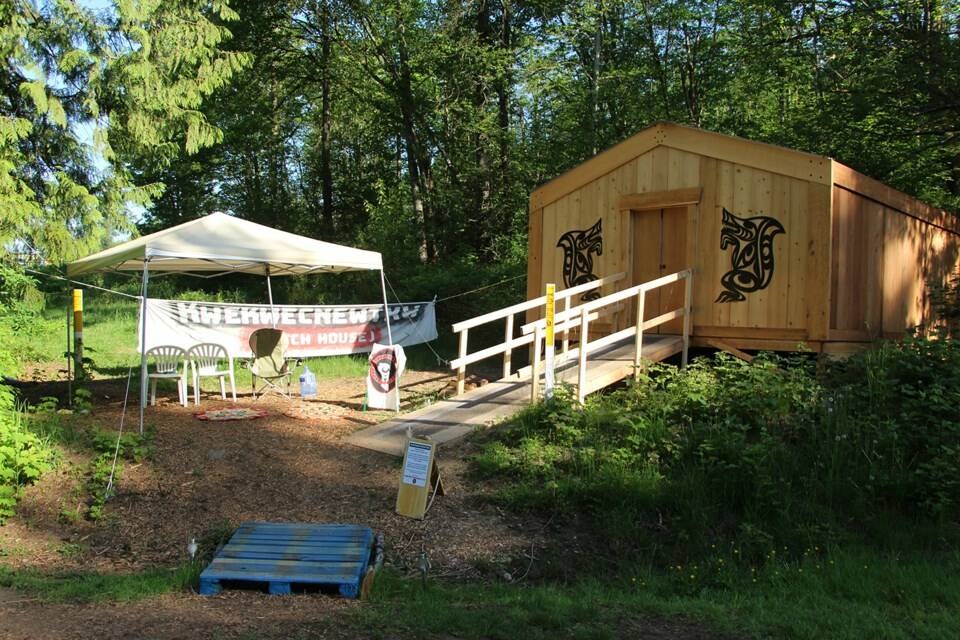A pipeline protester from the Tsleil-Waututh Nation must serve a 28-day jail sentence, the B.C. Court of Appeal has ruled.
A judgment handed down Wednesday dismissed Will George’s claims that a B.C. Supreme Court judge erred in her sentencing last year, particularly regarding considerations related to George’s identity as an Indigenous person.
On the afternoon of Jan. 6, 2021, George took part in a blockade at the entrance to Trans Mountain Pipeline’s terminal on Burnaby Mountain. This happened 33 months after Trans Mountain obtained an initial injunction to restrain people from impeding work on the project, according to the appeal court’s judgment. By that time, more than 220 people had been arrested related to the protests.
On that day, George and other protesters parked a vehicle in front of the terminal entrance, and disabled it by removing its tires and wheels, blocking other vehicles from entering or exiting.
“Despite being advised the RCMP had been called, Mr. George was not dissuaded from his ongoing involvement in the blockade,” the judgment reads. When police arrived, he helped put the wheels back on the vehicle and moved it, but by that time the terminal had been blocked for three hours or more.
In October 2021, George was convicted of criminal contempt of court for his breach of the injunction. At sentencing, George’s lawyer argued three months of probation plus 100 hours of community service would be a fit sentence. However, the judge handed George a 28-day jail term.
George filed an appeal in B.C.’s highest court, arguing that the lower court judge focused too heavily on objectives of denunciation and deterrence, and not enough on rehabilitation, particularly in relation to a section of the Criminal Code that requires judges to pay special attention to the circumstances of Indigenous offenders.
By not drawing a distinction between George and the hundreds of other protesters, the sentencing judge erred by lessening George’s Indigeneity and therefore disregarded legal principles emphasizing that incarceration should be avoided for Indigenous offenders whenever possible, his lawyer argued.
But, writing for the panel of three judges, Justice Peter Voith disagreed, noting the sentencing judge considered George’s Indigenous heritage in deciding a fit sentence.
“In my view, the judge carefully and thoroughly considered both the nature and gravity of the offence as well as the degree of responsibility of the appellant. This included consideration of the unique circumstances the appellant faced as an Indigenous offender,” Voith wrote in his judgment.
Contempt of court is a “serious matter” regardless of context, with deterrence as the primary sentencing objective, rather than rehabilitation, Voith said, adding that considerations of First Nations heritage don’t require that the principles of restorative justice take priority.
George’s legal counsel also argued the sentencing judge failed to adequately account for his disconnection from his heritage, and failed to distinguish George from the other non-Indigenous protesters facing similar sentences. The appeal judge rejected these claims as well.
Voith said the sentencing judge recognized George’s early disconnection from his culture, but acknowledged that he later reconnected with his roots.
“He had lived on the Tsleil-Waututh Nation reserve in North Vancouver since he was 21. He was 42 years old when he was sentenced,” Voith said. “Since 2018, he had ‘made further efforts to reconnect with his Aboriginal heritage’ when he helped build the Watch House near the Burnaby Terminal.”
While George’s counsel and the Crown both observed his strongly held environmental beliefs, Voith said neither “made any real effort” to tie George’s views to the sentencing judge’s considerations of the impact of his First Nations heritage.
“Indeed, at the hearing of the appeal, counsel for the appellant accepted that an Indigenous offender’s strongly held beliefs, without more, would not differentiate the offender from other non-Indigenous offenders,” Voith said, dismissing the appeal.
George could file appeal with Supreme Court of Canada
In a statement released by the Wilderness Committee after the ruling, George expressed dismay at the decision.
“Canada is sending me to jail because I was doing the work the colonial government failed to do – protecting my territory and my nation from a catastrophic oil spill,” he said “Tsleil-Waututh Nation has worked for a decade to oppose the Trans Mountain pipeline, but Prime Minister Trudeau failed us, so I am left with no choice but to do whatever I can to stop it.”
George’s lawyer, Affan Bajwa, said that he is speaking with George about possibly filing an appeal with the Supreme Court of Canada, which would bring his client out of jail until a decision is made there.
Speaking to the North Shore News, Bajwa said the result is unfortunate.
“I think the court had an issue with it not being put to them that he had strongly held beliefs about what happened with both the Trans Mountain Pipeline and the Burrard Inlet,” he said. “It’s quite obvious that he does have strongly held beliefs about his cause. So I think I disagree with the court in that regard.”




